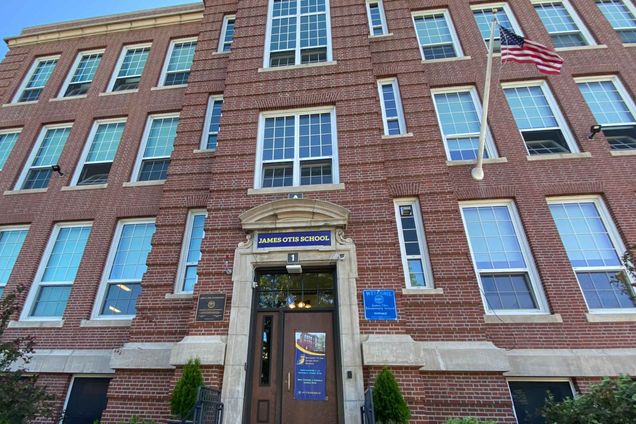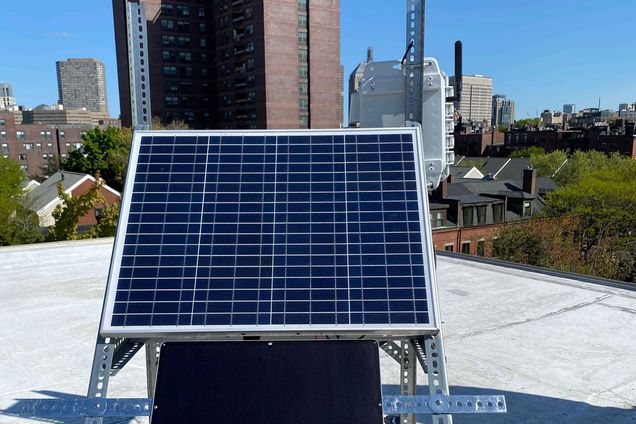Promoting healthy indoor air quality, sustainability, and climate resilience in schools.
Clean Air for Healthy Learning
In the United States, 50 million children in grades K-12 spend more than 30 hours each week at school — but there are few standards for indoor environmental quality. Viruses, mold, air pollutants, high temperatures, and relative humidity can be major stressors in classrooms, negatively impacting students’ health and learning.
In 2022, Boston Public Schools (BPS) launched a district-wide Indoor Air Quality (IAQ) Monitoring System to measure and improve air quality and thermal comfort for a better teaching and learning environment. More than 4,400 sensors are connected to an online public dashboard, providing real-time data on carbon dioxide, carbon monoxide, particulate matter, temperature, and humidity levels at all Boston Public Schools. By monitoring and analyzing this data, the district can address high IAQ levels, adjust building temperatures, evaluate school improvements, advocate for better ventilation, and ensure equitable resource allocation.
Real-time Air Quality Data in Boston Public Schools
Hours per day students and teachers spend inside schools
Total number of BPS schools in the district

Indoor Air Quality sensors installed in BPS schools
Rooftop Outdoor Air Quality sensors installed in BPS schools

Research Approach and Goals
This one-of-a-kind dataset inspired Patricia Fabian, who has studied indoor air quality for more than 20 years, to pursue an ongoing research collaboration with BPS’s Sustainability, Energy, and Environment Program. The goal: to turn all this data into meaningful information. BPS credits the partnership with helping to prioritize operational improvements and investments such as new HVAC systems and engage the BPS community in these efforts.
Fabian, an Associate Professor in Environmental Health at BU’s School of Public Health, leads the Clean Air, Health, and School Sustainability (CHESS) project through her Sustainable Built Environment Lab. CHESS uses data-driven, community-engaged, actionable research to promote healthy indoor air quality, sustainability, and climate resilience in all schools.
CHESS takes an interdisciplinary approach. The project draws on resources from across the School of Public Health and BU for expertise in data management and analysis, building science, environmental health, and community engagement.
In the Media

“[This] is a really groundbreaking, one-of-a-kind dataset,” says Fabian. “[BPS] can use it to make adjustments to their systems and operations or to find out when there are problems like a carbon monoxide leak, but they are resource-constrained to take the billions of data points generated every year and use them to support grant applications, decisions, and policies. That is where this partnership comes in.”
Journal Articles & Reports
 Rethinking Heat in Thousands of School Classrooms Through Continuous Monitoring and Novel Exposure Metrics (6/17/2025) - Indoor Environments
Rethinking Heat in Thousands of School Classrooms Through Continuous Monitoring and Novel Exposure Metrics (6/17/2025) - Indoor Environments Decision Tools for Schools Using Continuous Indoor Air Quality Monitors: A Case Study of CO2 in Boston Public Schools (6/14/2025) - The Lancet Regional Health
Decision Tools for Schools Using Continuous Indoor Air Quality Monitors: A Case Study of CO2 in Boston Public Schools (6/14/2025) - The Lancet Regional Health Toward Healthier Air in Schools: The State of Indoor Air Quality Programs in K-12 Schools in the U.S. & Findings to Guide Action (6/1/2025) - Boston University Sustainable Built Environment Lab
Toward Healthier Air in Schools: The State of Indoor Air Quality Programs in K-12 Schools in the U.S. & Findings to Guide Action (6/1/2025) - Boston University Sustainable Built Environment Lab Estimating Air Exchange Rates in Thousands of Elementary School Classrooms Using Commercial CO2 Sensors and Machine Learning (3/6/2025) - Indoor Environments
Estimating Air Exchange Rates in Thousands of Elementary School Classrooms Using Commercial CO2 Sensors and Machine Learning (3/6/2025) - Indoor EnvironmentsWebinars
- Healthy Indoor Air: A Global Call to Action, High-Level Side-Event of United Nations General Assembly (September 23, 2025)
- Boston Public Schools: Leaders in IAQ Monitoring, hosted by the National School Boards Association and the Go Green Initiative (July 15, 2025)
IGS-affiliated Project Leaders
-

M. Patricia Fabian
Associate Director, IGS;
Professor, Environmental Health, School of Public Health
